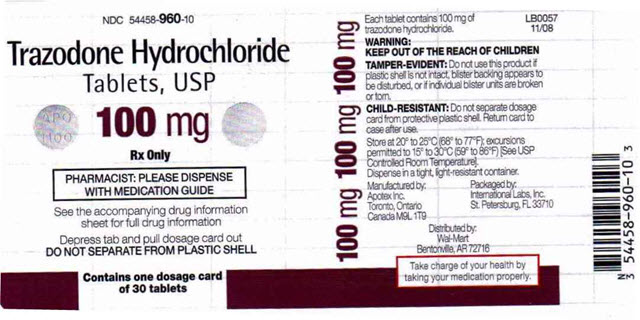Trazodone as a Sleep Aid
Insomnia and Antidepressants: Good or Bad
The connection between sleep disturbances, sleep disorders and depression is well-documented. So it might make sense that a few anti-depressant medications are also useful in the treatment for insomnia.
Trazodone was primarily created to treat depression. But the drug also has been successfully applied to a number of other problems including insomnia, bulimia, and schizophrenia, to name a few “off-label” uses. Off-label means the drug is not purposely manufactured for those purposes, is not FDA approved for the use, but is commonly used regardless for its proven effectiveness.

How Trazodone Works
The mechanism of anti-depressants like trazodone are different than that of straight forward sleep medications. The compounds in trazodone stimulate serotonin in the brain, yet another part of the complex neurological process. But it should be noted that trazodone is not a selective serotonin reuptake inhibitor (SSRI). Serotonin is a brain neurotransmitter, as are the GABA receptor and Omega 1 receptor. The latter two are both targets of popular sleep medications and hypnotics. Serotonin provides mood stability and when in small supply creates depression symptoms including mood disorders and the symptoms associated with insomnia. Remember, the two are closely related. Because insomnia symptoms may be triggered by clinical depression, the symptoms are typically considered secondary. This is the primary reason why you should see your doctor for chronic insomnia.
Treating Insomnia with Trazodone: Controversy
Sleep scientists and physicians committed to unraveling insomnia causes often rail against the use of trazodone and other anti-depressants in the treatment of insomnia. Alternatives specifically designed to address the neurological upset associated with insomnia include popular and widely used hypnotics like Ambien and Lunesta, along with the use of cognitive behavioral therapy, an effective non-pharmacologic treatment.
Insomnia comes in three distinctive types and most sleep aids are designed to treat one or two, and often not all three. Sleep onset insomnia is difficulty falling asleep; middle insomnia is trouble staying asleep; and late insomnia is waking very early in the morning unable to return to sleep.
As a sleep aid trazodone can be used as a treatment for a longer period of time than can many of the popular sleep aids. Most prescription sleeping pills are licensed for a maximum of 2 weeks. Trazodone’s half-life, 3-6 hours, means it is most likely to be used as a treatment for sleep onset or middle insomnia sufferers.
Risks and Side Effects
Anti-depressants are very powerful drugs. Trazodone should only be taken under the advice and supervision of a physician aware of your insomnia and possibly associated depression. Common side effects include: drowsiness, headache, nausea, and loss of concentration.
